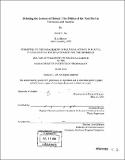| dc.contributor.advisor | Suzanne Berger. | en_US |
| dc.contributor.author | Art, David C., 1972- | en_US |
| dc.contributor.other | Massachusetts Institute of Technology. Dept. of Political Science. | en_US |
| dc.coverage.spatial | e-gx--- e-ge--- e-au--- | en_US |
| dc.date.accessioned | 2005-09-26T20:46:16Z | |
| dc.date.available | 2005-09-26T20:46:16Z | |
| dc.date.issued | 2004 | en_US |
| dc.identifier.uri | http://hdl.handle.net/1721.1/28497 | |
| dc.description | Thesis (Ph. D.)--Massachusetts Institute of Technology, Dept. of Political Science, 2004. | en_US |
| dc.description | "June 2004." | en_US |
| dc.description | Includes bibliographical references (v. 2, leaves 301-314). | en_US |
| dc.description.abstract | This dissertation argues that public deliberation is a transformative force in democratic politics. I build a framework for analyzing public debates in advanced industrial societies, and then use it to illuminate the political stakes of "coming to terms with the past" in societies with recent histories of mass violations of human rights. My dissertation recasts dealing with the past as a punctuated series of elite debates over the "lessons of history." These lessons become important elements of political culture and important variables in partisan competition. My cases are Germany and Austria, and the dissertation addresses an important empirical puzzle: despite similar electoral institutions, partisan political landscapes, and pressures from immigration, right-wing populist parties have experienced very different fates over the last two decades in the two states. Austria has produced one of Europe's most successful right-wing populist parties (the Austrian Freedom Party, FPO), but no such party has come close to establishing itself in Germany. What explains the divergent strength of the far right in the two surviving successor states of the Third Reich? I argue against existing structural explanations, and instead contend that the divergence between Germany and Austria stems from differences in elite ideas about the Nazi past. In Germany, public debates about Nazism produced an elite consensus that identified right-wing populism as a threat to Germany democracy. When the right-wing populist 'Republikaner' party first appeared, other political parties, the media, and groups within civil society actively combated it and prevented it from establishing itself as a permanent force in German politics. In Austria, however, public debates about the | en_US |
| dc.description.abstract | (cont.) Nazi past produced a nationalist backlash among political parties, the media, and civil society. This reaction created the ideal environment for Jorg Haider to engineer the FPO's electoral breakthrough and consolidation. My findings suggests that to explain the success and failure of right-wing populist parties in general, we need to focus on the strategies that other political parties, the media, and groups in civil society use to deal with them. | en_US |
| dc.description.statementofresponsibility | by David C. Art. | en_US |
| dc.format.extent | 2 v. (314 leaves) | en_US |
| dc.format.extent | 17933757 bytes | |
| dc.format.extent | 17975737 bytes | |
| dc.format.mimetype | application/pdf | |
| dc.format.mimetype | application/pdf | |
| dc.language.iso | en_US | |
| dc.publisher | Massachusetts Institute of Technology | en_US |
| dc.rights | M.I.T. theses are protected by copyright. They may be viewed from this source for any purpose, but reproduction or distribution in any format is prohibited without written permission. See provided URL for inquiries about permission. | en_US |
| dc.rights.uri | http://dspace.mit.edu/handle/1721.1/7582 | |
| dc.subject | Political Science. | en_US |
| dc.title | Debating the lessons of history : the politics of the Nazi past in Germany and Austria | en_US |
| dc.type | Thesis | en_US |
| dc.description.degree | Ph.D. | en_US |
| dc.contributor.department | Massachusetts Institute of Technology. Department of Political Science | |
| dc.identifier.oclc | 57306376 | en_US |
